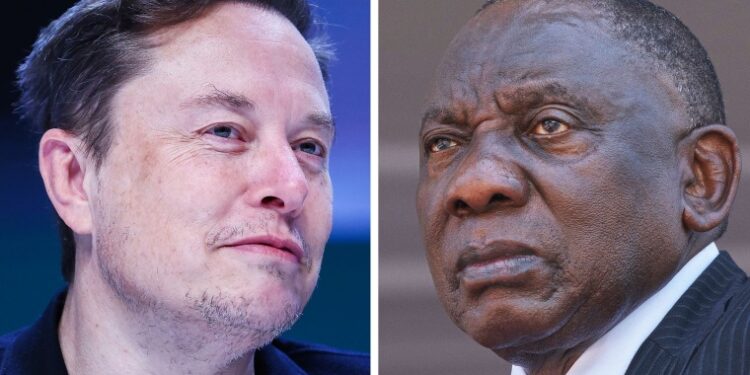President Donald Trump has signed an executive order cutting U.S. aid to South Africa, following claims he has made about the country discriminating against white farmers.
“South Africa is confiscating land, and treating certain classes of people VERY BADLY,” the president said in an initial post on his social media platform Truth Social earlier this month. “Massive Human Rights VIOLATION, at a minimum, is happening for all to see.”
The president’s executive order on Friday included an offer to resettle white South Africans whom he called “victims of unjust racial discrimination.” A White House summary of the order said that “as long as South Africa … allows violent attacks on innocent disfavored minority farmers, the United States will stop aid and assistance to the country.”
Trump had said he would cut off all funding to South Africa, most of which goes toward its HIV/AIDS program, “until a full investigation of this situation has been completed!”
South Africa’s government has said that it “has not confiscated any land.” Where does the truth lie?
Why now?
The executive order comes after a new South African land law went into effect. In focusing on South Africa, the president is echoing the views of Department of Government Efficiency head Elon Musk, who was born and raised in South Africa.
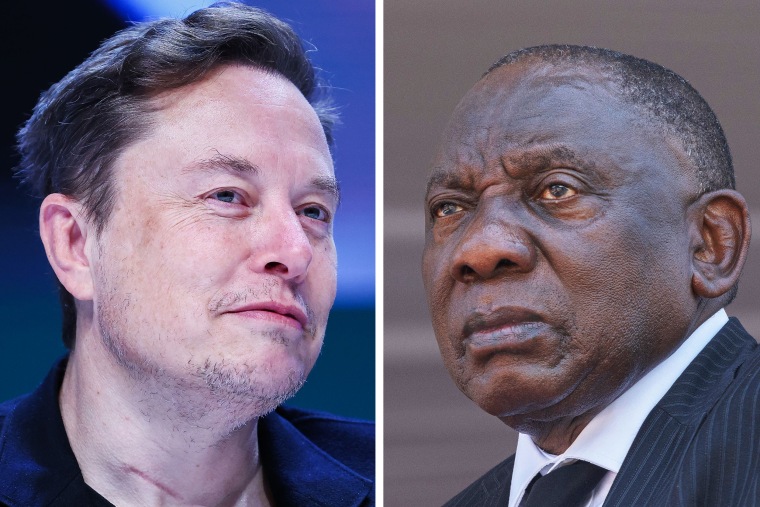
The world’s richest man and now a member of Trump’s inner circle, Musk has described his birth nation as having “racist ownership laws,” accusing its government of doing too little to stop what he has referred to as a “genocide” against white farmers.
According to South African government data from 2022, around 7% of the population of South Africa is white.
But, in a hangover from the country’s apartheid system of white minority rule that ended 30 years ago, white farmers own approximately three-quarters of South Africa’s land.
In addition, South Africa’s white working population earns nearly three times the average wage of Black workers, according to 2022 World Bank figures.
New land law
Led by President Cyril Ramaphosa, the government last month passed the Expropriation Act, which allows the government to expropriate land — in some cases without compensation — in certain instances when it is unused or there’s public interest in its redistribution.
Members of Parliament passed the bill despite the opposition of the mostly white-led Democratic Alliance, a junior coalition partner and erstwhile rival of Ramaphosa’s ruling African National Congress party.
That has reignited a national debate over land reform in a country where the legacy of a white minority stripping its Black population of land looms large.
The ANC has vowed to reduce the stark disparity in land ownership, but progress has been slow since apartheid collapsed in 1994 and Nelson Mandela was swept to power.
Critics of the new law say it could send panic through the farming industry, send land values plunging and provoke violent land grabs such as the one in neighboring Zimbabwe during the 1990s.
But Ruth Law, a professor at the Institute for Poverty, Land and Agrarian Studies at the University of Western Cape in Cape Town, says the new law mostly clarifies the expropriation powers the government has had for decades.
“It’s a law 30 years too late,” she said.
“It’s absolutely a matter of misinformation,” she added, referring to claims that the government’s expropriation powers are new.
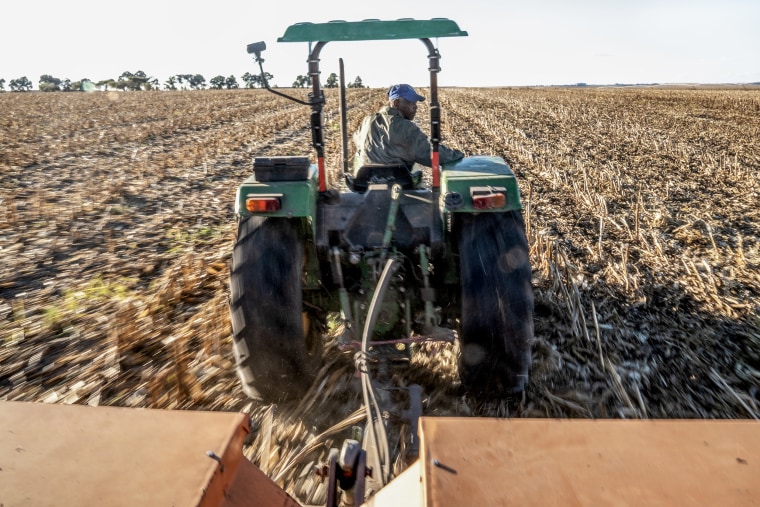
The new law is “not a confiscation instrument,” Ramaphosa said in a post on X last week.
Discriminatory killings?
While white South Africans have been subject to violence and murder, there is no official data to suggest that they are disproportionately attacked in a country with a high crime rate.
In 2023, a little under 300 white-owned farms were attacked across South Africa, with 49 people killed in those attacks, according to figures from AfriForum, a lobby group representing Afrikaners, some 6.9 million South Africans of mainly Dutch descent who own a large proportion of farmland.
According to the most recent agricultural census, held once a decade, there were more than 40,000 commercial farms in South Africa in 2017.
While South Africa’s police force has not released any official data on crime broken down by race and did not respond to NBC News’ request for such figures, its publicly available statistics show that the country’s average homicide rate for the same year was 75 per day.
South Africa’s foreign and agriculture ministries also did not respond to NBC News’ requests for comment on allegations of racist laws or the killing of white farmers.
However, in a statement Thursday, its foreign ministry said that “there is no arbitrary dispossession of land / private property. This law is similar to the Eminent domain laws,” referring to rules in many countries, including the U.S., that allow for the compulsory acquisition of private property for public use.
While the potential lack of compensation for land expropriation is the part of the law that has caused the most controversy, owners still have the right to fight those exceptional decisions in court.
“It’s not going to be like, overnight, a land owner is going to lose his property,” said Zsa-Zsa Boggenpoel, a professor of private law at South Africa’s Stellenbosch University. “It’s a long process.”
‘White genocide’
Musk directed an X post at Ramaphosa last week asking, “Why do you have openly racist ownership laws?” But the billionaire’s criticisms of South Africa have deep roots.
For years, a small but vocal group of white farmers has claimed to have fallen victim to targeted racial attacks. That rhetoric has gathered momentum since discussions began around the new expropriation law, with white nationalists claiming a “genocide.”
In 2023, Musk said Ramaphosa’s government was silent against those “openly pushing for genocide of white people in South Africa.”
The issue also appears to have been on Trump’s radar for years. In 2018, he said he had directed then-Secretary of State Mike Pompeo to “closely study the large scale killing of farmers.”
But there is no evidence of such a killing spree, experts have said. In 2018, former-U.S. Ambassador to South Africa Patrick Gaspard called the idea of a white genocide a disproven myth.
Gareth Newham, head of the justice and violence prevention program at the Institute of Security Studies in South Africa, says that white farmers are most likely targeted because they are relatively wealthy and vulnerable because they live in remote areas, not because of their race.
“Far-right-wing groups in South Africa actively go to America and promulgate this idea of a white genocide because, of course, when you have a high murder rate, white people do get murdered,” Newham said, adding that the proportion of white people murdered is lower than other race groups, not higher.
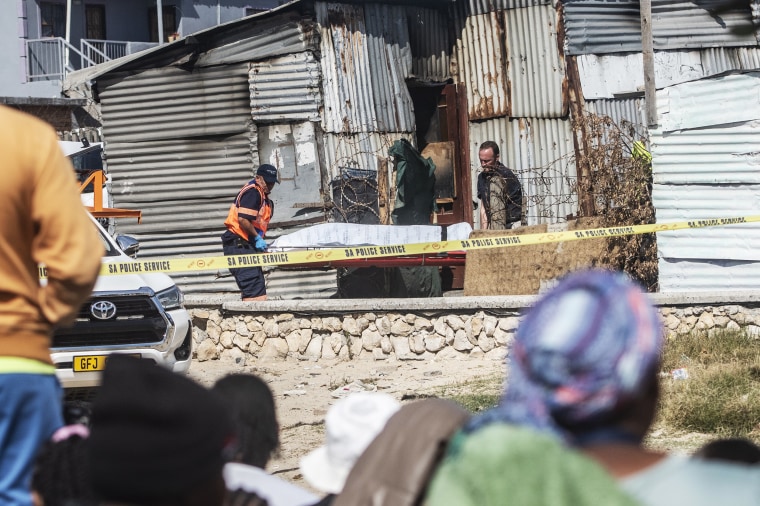
Inside South Africa, the false claims have been “weaponized for political purpose,” Law, the professor at the University of Western Cape, said, with lobby groups “deliberately misrepresenting this as confiscation, racially based confiscation, and linked to a supposed white genocide.”
AfriForum said Saturday that the Trump administration’s executive order “is a direct result of President Cyril Ramaphosa and his government’s irresponsible actions and policies” but added that Afrikaners see their future as remaining in South Africa.
In the past, Elon Musk has also criticized South Africa’s affirmative action business laws. His internet satellite company Starlink was denied a license in South Africa because it didn’t meet the affirmative action criteria. Musk did not respond to NBC News’ request for comment on which laws he sees as racist.
Musk’s father, Errol Musk, said last Tuesday that he had brokered a call between his son and Ramaphosa. He told Reuters, “I can only imagine that Elon would have said, ‘Look, we want to help you, but you have to quit this war on white people in South Africa.’”
What’s at stake?
If anything, Trump’s suspension of aid and threat to stop AIDS funding may harm the white farmers whom he and Musk seek to defend.
“If you prevent money from helping things like HIV/AIDS or some of the more harsh consequences of poverty, those white commercial farmers are going to have much bigger problems with people living around them and their workforces,” said Newham.
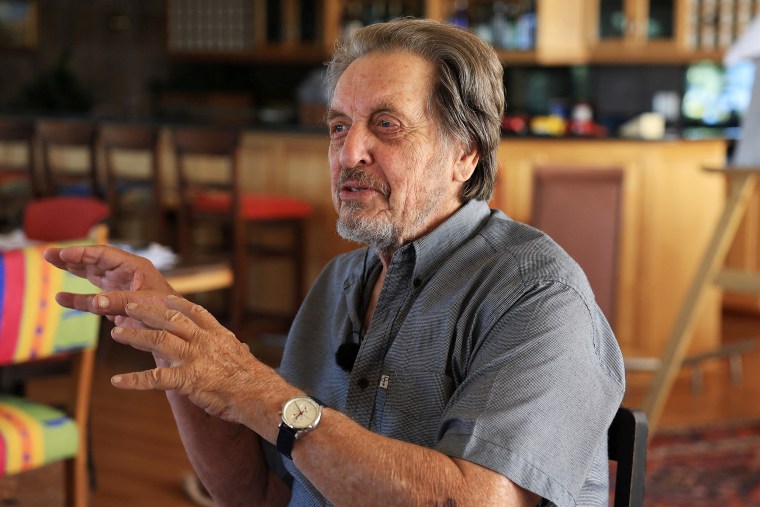
Trump’s decision to dismantle USAID, the agency that helps to fight starvation and poverty overseas, has already put at risk the more than $450 million a year in aid the U.S. supplies to South Africa, according to State Department figures.
Now, his latest attack could see the U.S. pull funding from the president’s Emergency Plan for AIDS Relief, or PEPFAR, which is arguably the most successful and ambitious foreign aid program since the Marshall Plan rebuilt Europe after World War II.
Introduced by the administration of President George W. Bush, PEPFAR has saved 25 million lives from AIDS, helped provide 20 million people with HIV antiretroviral treatment and resulted in the birth of 5.5 million HIV-free babies to HIV-positive mothers.
In a country where more than 8 million people of a population of 60 million live with HIV, Ramaphosa has said that PEPFAR accounts for around 17% of the country $2.5 billion annual HIV/AIDS budget.
“The world is baffled,” Aaron Motsoaledi, the country’s health minister, told reporters after the U.S. announced it would suspend foreign aid.

